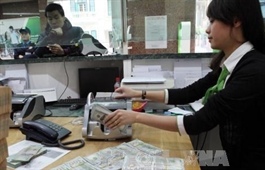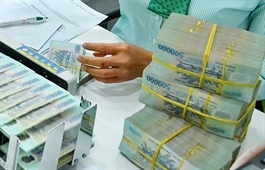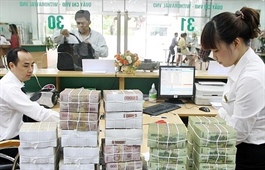Government tax cuts to ease burden on businesses
Government tax cuts to ease burden on businesses
The Vietnamese government is rolling out several tax relief measures to support cash-strapped businesses, particularly local and foreign enterprises, the aviation industry, and agricultural groups.
Last week, the National Assembly (NA) passed a 30 per cent corporate income tax (CIT) reduction for businesses with maximum annual revenue of VND200 billion ($8.7 million) and less than 200 employees.
Thus, macro-, small-, and medium-sized businesses satisfying these criteria – which make up around 97 per cent of companies operating in Vietnam – will be eligible for the fresh cut. Chairman of the NA’s Finance and Budget Committee Nguyen Duc Hai noted that the state budget will be reduced by VND23 trillion ($987 million) if eligible groups apply for the tax break.
Besides this, the Ministry of Finance (MoF) has proposed to cut environmental protection tax on jet fuel by 30 per cent to reach VND2,100 (9.1 US cents) per litre.

The Vietnamese government is extending tax support to businesses to weather the storm
|
The move is envisaged to mitigate obstacles for the aviation industry amidst the outbreak, though the state budget will experience a sharp reduction of around VND87.33 billion ($3.8 million) per month.
The proposal is part of the NA Standing Committee’s draft resolution on environmental protection tax on jet fuel, which has been sent to gather contributions.
However, the new cut, if possible, represents the government’s continuous encouragement to ease the financial burden of aviation companies that have been hit the hardest by the coronavirus pandemic. Specifically, financially-wounded carriers such as Vietjet and Vietnam Airlines would see benefits from the reduction.
Meanwhile, MoF Minister Dinh Tien Dung stated that businesses have braced themselves for a long and steep coronavirus-triggered downturn, while market turmoil has disrupted many companies.
“Vietnamese authorities hope to boost distressed companies affected by the economic fallout of the outbreak, as well as help the vulnerable industries through tax reduction and deferrals,” added Dung.
Luong Thuy Trang, manager of tax services at Grant Thornton Vietnam, noted that the Vietnamese government has provided fair and equitable treatment regardless of nationality and capital structure, hence tax relief measures will be accessed nationwide, including foreign-invested enterprises (FIEs).
Some FIEs might not be entitled to 30 per cent CIT reduction if they cannot satisfy the requirements.
“Yet, multinational firms could enjoy other tax relief prescribed under the recently-enacted Decree No.41/2020/ND-CP on extending the deadline of tax and land rental fee payment; and Resolution No.84/NQ-CP aimed at further reducing the pandemic’s impact on businesses,” Trang told VIR.
“For example, tax exemption and extension can boost more liquidity for FIEs, such as 15 per cent reduction of land rental or 50 per cent reduction of stamp duty for domestically manufactured/assembled automobiles, or work permit extensions for foreign employees.”
Nguyen Huu Quang, deputychairman of the NA’s Committee for Finance and Budget, said, “The crisis has so far imposed far-reaching consequences on the whole country, especially for the state budget. We don’t know when the domestic economy will bounce back, so I think these tax measures are drastic decisions from government in the face of tight state revenue and expenditure.”
Just last week, data from the General Department of Taxation revealed the tax revenue in the state budget was approximately of VND500 trillion ($21.74 billion) in the first five months of 2020, equal to 97.6 per cent of the same period last year.
On the other hand, last month’s figure was VND58 trillion ($2.5 billion), equal to only 63.1 per cent of last May. Local media cited that the reduction was partially stemming from nationwide social distancing restrictions, which impeded non-essential businesses.
Fresh data from the Institute of International Finance, meanwhile, revealed that the first quarter of 2020 experienced the most substantial capital outflow from emerging markets ever, including Vietnam, exceeding the worst points of the global financial crisis more than a decade ago.
The CIT reduction will be in line with higher profits, as well as higher earnings per share. Besides this, the legislature has just passed a fresh solution on exemption of tax for using agricultural land for the 2021-2025 period, which is roughly worth VND7.5 trillion ($326 million) annually.
The CIT cut and agricultural land tax exemption, along with the landmark EU-Vietnam Free Trade Agreement about to take effect, will likely encourage more foreign companies to further venture into Vietnam.
The EVFTA will eliminate over 99 per cent of tariffs, with the EU removing duties on thousands of items sourced from Vietnam. Meanwhile, Vietnam will liberalise 65 per cent of import duties on EU exports to Vietnam, with the remainder of duties being gradually eliminated over a 10-year period.


























